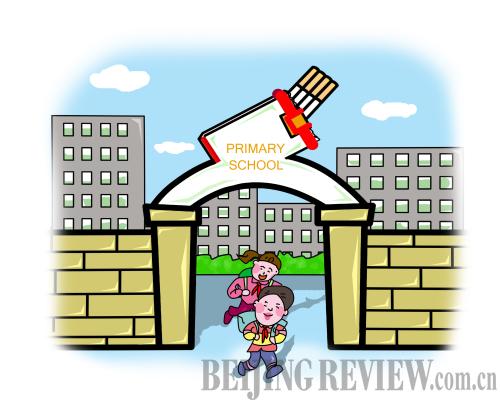|
 |
|
(LI SHIGONG) |
After the massive earthquake in Sichuan Province in May 2008, a primary school funded by a tobacco company was set up in the quake-stricken area. On the roof of the school building stands the signboard "Sichuan Tobacco Hope Primary School." A slogan engraved on another board reads, "Tobacco helps your success."
Statistics show in China, there are 17 Hope primary schools named after sponsoring tobacco companies. All of them are in economically backward areas.
Tobacco control activists say the practice exerts negative social impacts and it is necessary to limit tobacco companies' sponsorship of education. They stress that tobacco companies, by sponsoring education, want to build up a positive image for themselves and promote the sales of tobacco products. Therefore, only a comprehensive ban on tobacco advertising, promotion and sponsorship will reduce consumption, especially among young smokers.
Tobacco companies, however, argue that the sponsorship of education shows their passion about social responsibilities, which should be encouraged.
Some people are also worried that if tobacco companies retreat from supporting the Project Hope for developing education in poverty-stricken rural areas, it will be difficult for concerned schools to survive the shortage of operational funds and if they cannot, then students will be the biggest victims.
Sugarcoated poison
Zhou Huan (www.jiaodong.net): Early this year, a 2-year-old baby in southwest China's Chongqing was surprisingly found to be skillful at smoking. It was later found the baby took up the smoking habit under the influence and allurement of others. This example shows how big the external environment's impact is on a child. What will happen to young students when tobacco advertisements are on campus?
Tobacco companies might argue the sponsorship of education shows that they are undertaking social responsibilities. In fact, they are trying to build up a positive self-image while making huge profits. Real charity is never profit-oriented.
Though tobacco companies' financial support has, to some extent, helped educational development in underdeveloped areas, their ill-motivated charitable activities are mostly harmful. Once profit-oriented sponsorship begins to prevail in the education sector, it will not only undermine charity efforts but also inflict a negative impact on students.
Wang Yanming (Beijing Times): In many countries, tobacco companies are barred from sponsoring entertainment and sports activities, let alone funding schools. In China, however, there is no legal ban on outdoor tobacco advertising although the country has ratified the WHO Framework Convention on Tobacco Control.
I do not deny tobacco companies' efforts to undertake social responsibilities, but only that they should do so in acceptable ways. The primary social responsibility of tobacco companies is to warn people of the harm of smoking and to encourage the youth to stay away from tobacco, rather than erecting promotional boards in schools.
Currently, China's highest tobacco consumption tax is 56 percent, which falls far behind developed countries where the tobacco consumption tax is as high as 60-90 percent. Tobacco companies are obligated to pay high taxes and try to support other industries by transferring profits to government financial revenues. It's ridiculous to see them showing off "charity" through financing the construction of Hope schools.
When tobacco companies have turned to Hope schools to promote their brands, it's high time for the government to formulate laws to curb such unscrupulous and immoral behavior.
Zhang Guifeng (Nanguo Morning Post): China's Advertising Law forbids tobacco advertising on public occasions. The country has also ratified the WHO Framework Convention on Tobacco Control, which explicitly says that "parties recognize a comprehensive ban on advertising, promotion and sponsorship would reduce the consumption of tobacco products." The treaty also prohibits all forms of tobacco advertising, promotion and sponsorship promoting a tobacco product by any means that are false, misleading or deceptive or likely to create an erroneous impression about its characteristics, health effects, hazards or emissions.
Obviously, naming a Hope school after the sponsoring tobacco company and erecting promotional boards with the slogan "Tobacco helps your success" violate stipulations in the WHO Framework Convention on Tobacco Control.
Imagine a young child growing up in a school where he is told tobacco is helpful day after day. Will this child develop a correct understanding of tobacco's harm and stay away from it? Who can ensure he will not become interested in tobacco products under such an influence?
Li Xingwen (Beijing Youth Daily): From a moral perspective, tobacco companies' title sponsorship of Hope schools is reproachable. While big cities have tightened restrictions on tobacco advertising, tobacco companies have turned to economically backward areas, particularly Hope schools that are in urgent need of financial support. It is immoral to take advantage of backward areas just because they lack money.
A medical report once revealed an experiment based on two groups of teenagers. One liked Formula One Racing and one didn't. Years later, 17 percent of teenagers who watched the sport often became smokers while the proportion for those who didn't watch it was only 1 percent. The reason was major advertising sponsors for Formula One Racing were world-famous tobacco companies.
From cities to the countryside, from adults to minors and from developed regions to underdeveloped regions, tobacco companies have consistently re-targeted their advertisements. The government should not tolerate their expansion and particularly their practice to "poison" young students.
| 